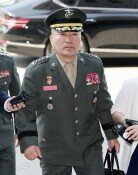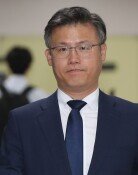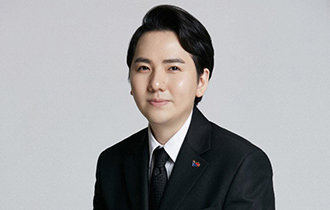[Editorial] Uri Party Fallout
The floor leader of the Uri Party, Kim Han-gil, assessed yesterday the formation of his party as a meaningful political experiment worth being recorded in political history. Concluding the experiment, he noted that the party would start over again by distinguishing between what needs to be maintained and what needs to be abandoned. He said a minimal Constitutional revision was necessary in order to stabilize politics and save political costs.
One cannot help but wonder, after making such an impudent remark, whether he is aware of how angry the public is for having been sacrificed for political experimentation.
The path the Uri Party, established on November 11, 2003, has trodden so far may have been a meaningful political experiment for Kim. However, the partys initially purported goal of becoming a centennial party turned out to be nothing but a complete lie to the public. As the public review the founding declaration of the Uri Party, which reads, We will lead efforts for national integration, political reforms and the establishment of peace on the Korean Peninsula, they feel like shedding meaningful tears.
Instead of achieving national integration transcending region, generation, class or ideology, the Uri Party not only divided the public but also kept fracturing them into 2% vs. 98 vs., Gangnam residents vs. non-Gangnam residents and Seoul National University (SNU) vs. non-SNU. The fee-based membership system and upward-nomination system for selecting party candidates the ruling party claims to have introduced for political reform have been used by supporters of President Roh and 386 generation government officials as a tool for controlling the party.
By being obsessed with self-reliance and engagement policy, the Uri Party allowed the North Korean regime time for nuclear development and strained the Korea-U.S. alliance.
The public clearly remembers President Roh Moo-hyun stressing overcoming regionalism in his congratulatory message after the creation of the Uri Party. Having defected from the Democratic Party under the pretext of fighting regionalism, Uri Party members should feel ashamed as they are now flocking to ex-President Kim Dae-jung, who appears to be about to resume his political life based on regionalism.
The Uri Partys proposal of revising the Constitution is doubtful as well. Constitutional scholar and chair professor of Myongji University Kim Chul-soo said, Once a debate on even a minimal extent of Constitution revision (making tenures of President and lawmakers equal) is triggered, some in the opposition parties which profess themselves as reformists and presidential hopefuls will be tempted to use it to their advantage. In other words, they are likely to encourage public debates on the amendment of the Constitution under the pretext of stabilizing politics and let opposition parties split, ultimately seeking the leftists return to power.
The Uri Party should never try to deceive the public yet again, while saying it is regretful about what it has done. The ruling party, which was so immersed into political experimentation that it has shaken up the nation and hurt the public livelihood, is neither qualified to propose constitutional revision nor capable of bringing a bright future for the nation. The public has already had enough with the tears theyve shed for the last three years.
Headline News
- Gov’t faces criticism over policy reversals and decision-making processes
- Controversy erupts over ‘single life’ welfare packages
- Gov’t announces worker protection measures for heat waves
- Madonna wearing Kahlo’s items faces controversy over special treatment
- Pirates' Bae Ji-hwan pulls off a stunning come-from-behind victory







